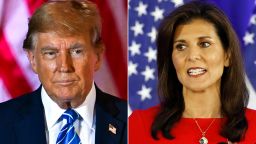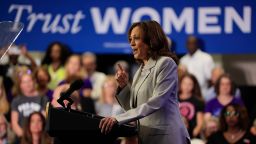Former President Donald Trump returned to the campaign trail Wednesday for the first time since his New York criminal hush money trial began in earnest last month.
He spent his one allotted weekday out of the courtroom hosting rallies in Wisconsin and Michigan, two critical battleground states he won in 2016 but lost to Joe Biden in 2020.
“I’ve got to do two of these things today. You know why? Because I’m in New York all the time with the Biden trial,” he told supporters in Freeland, Michigan, falsely suggesting that the president was involved with the hush money case.
Despite Trump’s and his campaign’s insistence that the former president would take advantage of every second he wasn’t tethered to the courtroom, the presumptive Republican presidential nominee has rarely used his days off from court to host political events in the more than two weeks since the trial began.
The absence from the trail hasn’t been entirely within his control.
A recent planned campaign stop in Wilmington, North Carolina, was canceled at the 11th hour due to severe storm weather. Trump, who is required to be present in court throughout his trial every weekday, except Wednesday, has instead spent much of his free time attending closed-door fundraisers, taking meetings and hosting dinners at Trump Tower. Last Wednesday, the former president escaped the city to play golf at his Bedminster, New Jersey, club, and spent this past weekend at his Mar-a-Lago home for his wife Melania Trump’s birthday. The campaign has arranged two stops around New York City, before and after court, but the majority of Trump’s politicking has been done before the cameras set up outside the courtroom.
Some people close to Trump have acknowledged that they are surprised by the dearth of traditional campaigning on the sidelines of the trial, especially given that the general election is just months away. Early polls suggest Michigan and Wisconsin pose a challenge for Biden and an opportunity for Trump to mine for electoral votes in the upper Midwest, and Republican allies would like to see him start laying the ground work now. Trump advisers see openings with critical working class voters unhappy with inflation, and with Arab American voters who disprove of Biden’s handling of the Israel-Hamas war.
Speaking Wednesday in Michigan, Trump said the “good news” was that his New York hush money case has “driven the poll numbers higher than we’ve ever had before.”
Recent polling shows that, as of now, Trump and Biden are in a statistical tie in Michigan and Wisconsin, as well as in Pennsylvania, another state the Democrat flipped in 2020.
Building his ground game
Trump’s team has hired state directors in both Michigan and Wisconsin, as they have in each battleground state. But the campaign is still in the early stages of building out the teams, according two senior Trump campaign advisers, which they say will be a mix of paid staffers and volunteers. The campaign is also planning to rely heavily on Republican National Committee officials to further assist in their ground game efforts.
Trump’s campaign is paying especially close attention to the polling in Michigan and Wisconsin, comparing the data with where Trump was in both 2016 and 2020, the senior advisers told CNN. It has spent almost no money on paid media in either state and alleges that the millions of dollars spent by the Biden campaign in both states is proof that Trump’s rival is being forced to spend money to reinforce his Democratic base amid low poll numbers.
Trump’s team believes that his ability to turn out his base is guaranteed, and instead plans to spend money to persuade outside voters to support him in November. That approach is both strategic and out of necessity, as Trump’s advisers acknowledge that they will not catch up to Biden’s vast and ever-growing campaign war chest.
In Michigan, a pro-Trump super PAC, MAGA Inc., has spent only $145,000 on what the campaign is deeming “urban radio” advertising. The ads are specifically targeting Black voters in Michigan by focusing on crime and immigration.
The Trump campaign has closely tracked the protest votes cast in the Wisconsin and Michigan primaries, where tens of thousands of people, many of whom protested Biden’s support for Israel during the deepening humanitarian crisis in Gaza, opted not to vote for the president in the Democratic primary.
In Wisconsin, roughly 48,000 votes, or 8.2% of those cast, were for “uninstructed” in the Democratic primary, which was held after Biden had already clinched the nomination. In the Michigan primary in February, more than 100,000 Democrats voted “uncommitted,” or 13.2% of the Democratic vote.
“That’s a colossal disaster for him,” one of the senior Trump advisers said, and it is something the campaign plans to message on aggressively in the months ahead.
“In Michigan and Wisconsin, that fraction of the vote can make a real difference,” the second senior Trump adviser said. “If even a fraction of that original audience is still convinced to stay where they are, that’s a catastrophic issue for Biden that we will exploit.”
Trump also has his own weaknesses in Michigan and Wisconsin. In the Michigan primary, former South Carolina Gov. Nikki Haley, who was still in the race at the time, received 297,124 votes, or 26.6% of the GOP vote.
In Wisconsin’s April 2 primary, Haley received 76,762 votes, or 12.7%, despite having suspended her presidential campaign weeks earlier.
Taking aim at Biden
At his rally Wednesday in Waukesha, Wisconsin, Trump criticized Biden’s leadership as protests against Israel’s war in Gaza spread across US college campuses.
“The radical extremists and far-left agitators are terrorizing college campuses, as you possibly noticed, and Biden’s nowhere to be found, he hasn’t said anything,” the former president said. “But they’re his political base.”
On the same day that a controversial ban on most abortions after six weeks of pregnancy went into effect in his home state of Florida, Trump asserted that people were “absolutely thrilled” that abortion laws are being decided on a state-by-state basis.
“Some people are unhappy because it’s too liberal a policy or too conservative a policy, but we brought it back into the states, where it has to be,” he said. Biden and Vice President Kamala Harris have explicitly blamed Trump for the 2022 overturning of Roe v. Wade and for the slew of abortion bans that some states have adopted since.
Hours later, Trump headed to Freeland in Saginaw County, Michigan – a county he lost by just over 300 votes in 2020. In his remarks there, he vowed to “bring the car industry back to Michigan” and again warned of an “economic bloodbath” for the auto industry if he is not elected in November.
The dueling stops follow his recent visits to both states on April 2, when he railed against what his campaign labeled as “Biden’s border bloodbath,” attacking the president for his handling of the southern border and highlighting alleged violent crimes committed by immigrants.
Trump’s decision to return to both states just a month later underscores how imperative they are to his path to winning the White House.
The former president’s 2016 victories in the Rust Belt were largely attributed to his success among blue-collar voters, who helped him produce a seismic crack in the so-called blue wall of states Democrats had relied on in every election going back to 1992.
This election, Trump’s advisers argue they plan to replicate those wins by making inroads with the same working-class voters who helped propel him to the White House in his first presidential campaign. Trump’s senior advisers have characterized both states as “must-win” in 2024, acknowledging that the former president’s path to victory is largely impossible without carrying the Badger and Wolverine states.
Biden won Michigan in 2020 by more than 150,000 votes. The margin was much tighter in Wisconsin, where he came out ahead by about 21,000 votes – a victory of about 0.7 percentage points.
The Trump campaign plans to set up a “robust volunteer-driven” organization this cycle, his advisers say, arguing that they have learned from the mistakes made four years ago that led to the former president’s defeat. They also plan to rely heavily on the RNC’s infrastructure to not only turn out voters, but also bring in first-time voters who support Trump.
However, Republicans have been slow to invest in key battlegrounds as they scramble to catch up to Democrats’ fundraising lead. Recent campaign filings with the Federal Election Commission show Biden’s principal campaign committee entered April with $85.5 million, while Trump’s main campaign account had $45.1 million in its war chest.
This story has been updated with additional information.










